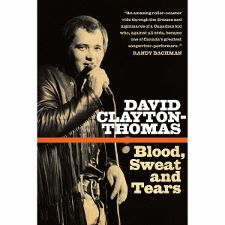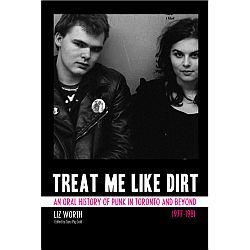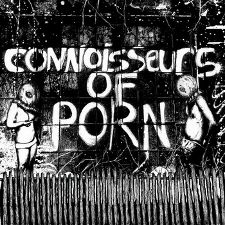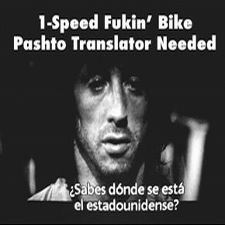| |
David Clayton-Thomas

Blood, Sweat and Tears
Penguin - 2010
John Liddle
|
If you really wanted to know what colour pills Blood, Sweat and Tears frontman David Clayton-Thomas took an hour before writing 'Spinning Wheel', this isn't the book for you. It is, however, a sober, reflective, introspective, reserved, diplomatic and effacing biography of one of Canada's better-known singer-songwriters.
The rags-to-riches portion of the travelogue is disturbing and begs the question, "How in the fuck did this guy ever amount to anything?" Born in Surrey, England, the child of a war bride, and raised in Willowdale in north Toronto, Clayton-Thomas portrays his father, Fred Thomsett, as a bitter, maniacal and violent WWII veteran, whose household tyranny knew no bounds. No surprise, then, that as a juvenile Clayton-Thomas found himself sleeping in office buildings, parked cars, and the occasional detention centre. His rock bottom of Phase 1 came when a no-nonsense magistrate gave him a four-year jail term for witness intimidation, and it was off to the Big House.
As a society, we long ago - at least officially - took many of the punitive and medieval aspects out of corrections; the focus, primarily, is on hollowing out the soul. Strangely, happily, fortuitously, the reverse happened in this case as Clayton-Thomas took to song while in the pen, and the rest, as they say, is history - or at least the beginning of a history: upon his release, it was Toronto, Yorkville, Yonge Street, bars, drugs, small clubs, rubbing shoulders,and incremental successes like 1966's 'Brain Washed' - this is Phase 2.
Phase 3 is the phenomenal success of Blood, Sweat and Tears. Fast facts: Clayton-Thomas joined in after their first album, having met some band members in Greenwich Village; their second album spent seven weeks at Billboard #1, with three top hits ('Spinning Wheel', 'You've Made Me So Very Happy', and Laura Nyro's 'And When I Die'). Four million copies. And - irony of ironies - it beat out Johnny Cash's Live at Quentin Prison for the 1970 Grammy (among other lousy albums, like Abbey Road, Crosby, Stills and Nash's CSN and the Fifth Dimension's Age of Aquarius). Woodstock (sadly, not filmed because of a money dispute). Europe. The rise of "brass rock". Las Vegas. Riches. Immigration issues. Stress. Drugs and booze. Fast cars. Apotheoses. Breakups and makeups...the usual.
Phase 4, which by my arbitrary calculation I say takes Clayton-Thomas from the end of BST as a going concern to the present day, is the nicest part to read. The prose is smooth, measured and colloquial. There are more than a few "I've loved and lost, and learned to love again after I found myself" soliloquies, but in exchange for that we are given some nice insights into the biz (he notes that "record companies will make you famous and you will make them rich"). There is a grandfatherly measure to his voice - "Being famous won't make you a better person", he surmises. This is an apologetic, and largely humble self-portrait, wrapped in a warm sense of retrospective satisfaction.
|
David Clayton-Thomas
|
Suggestions

Liz Worth
Treat Me Like Dirt (An Oral History of Punk in Toronto and Beyond)
Bongo Beat

The Connoisseurs of Porn
The Peasant Terror / Chicken - 7"
Buzz

1-Speed Bike
Pashto Translator Needed
(independent)
|








